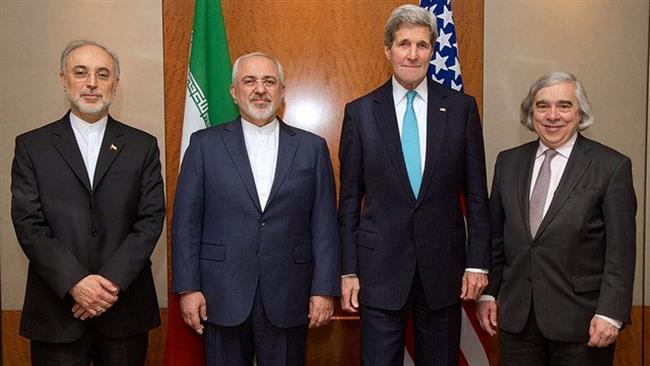Washington, Tehran resume high-level nuclear talks

By Sara Rajabova
Washington and Tehran have resumed their high-level nuclear negotiations in Geneva with an aim to narrow down remaining gaps and reach initial deal until March 31 deadline for political agreement.
The second round of Iran-U.S. negotiations over Tehran’s nuclear program started on February 23 between John Kerry, U.S. Secretary of State and Mohammad Javad Zarif, Iranian Foreign Minister, as well as Ernest Moniz, U.S. Energy Secretary and Ali Akbar Salehi, Iran's atomic nuclear chief.
Zarif and Kerry ended the first leg of talks on February 22 to resolve the remaining issues on Tehran’s nuclear program as a deadline for reaching an inclusive agreement draws closer.
Also, deputy foreign ministers of Iran and their counterparts from member states of the P5+1 (the U.S., UK, France, Russia, China and Germany) ended a 1.5-hour talks on Iran’s nuclear program in Geneva.
Following the talks, Seyed Abbas Araqchi, Iranian Deputy Foreign Minister said the talks between Iran and the Group 5+ ended with no progress. "The discussions went off very well, but we have not reached any progress so far," Itar-Tass quoted Araqchi as saying.
He also noted that Tehran will continue nuclear talks only if the other side shows respect. He warned that otherwise Iran will leave the negotiating table.
This came as Kerry said on February 21 before joining the talks in Geneva that the U.S. has no intention of extending the deadline on the nuclear talks, which is currently set for March 31, and is ready to pull away from the negotiations table.
However, some experts consider that such statements were put forward because of the pressure on the U.S. government to reach an agreement with Iran over Tehran’s nuclear energy program.
James George Jatras, a former U.S. diplomat and adviser to the Senate Republican leadership downplayed Kerry’s warning to walk away from the nuclear saying he is playing domestic politics.
He considered that U.S. President Barack Obama would like to have a deal with Iran, but he’s under a lot of pressure to try to bring negotiations to a conclusion that he can defend domestically, Press TV reported.
“I doubt very much that the United States would walk away from the negotiations because this is a strong priority for Obama who has very little to show in the realm of foreign policy,” Jatras added.
On the other hand, Israel, who is critical of Washington’s Iran policy, is closely following the nuclear talks between Iran and the United States.
Benjamin Netanyahu, Israeli Prime Minister said it was "astonishing" that the talks, which could end by allowing Iran "to develop the nuclear capabilities that threaten our existence", were proceeding.
Any agreement would be "dangerous for Israel, the region and the entire world," Netanyahu said on February 22, in time when the U.S.-Iranian delegations engaged in narrowing the gaps to reach nuclear deal.
Iran and the P5+1 extended their talks to reach a comprehensive nuclear deal, with the aim of reaching a high-level political agreement by March 31, and confirming the full technical details of the agreement by July 1.
After the sides failed to meet the November 24, 2014 deadline they also extended the Geneva nuclear deal, which was signed in November 2013 to provide Iran with some sanctions relief in exchange for Tehran agreeing to limit certain aspects of its nuclear activities.
The U.S. and some of its Western allies suspect Iran of developing a nuclear weapon - something that Iran denies.
--
Sara Rajabova is AzerNews’ staff journalist, follow her on
Twitter: @SaraRajabova
Follow us on Twitter @AzerNewsAz
Here we are to serve you with news right now. It does not cost much, but worth your attention.
Choose to support open, independent, quality journalism and subscribe on a monthly basis.
By subscribing to our online newspaper, you can have full digital access to all news, analysis, and much more.
You can also follow AzerNEWS on Twitter @AzerNewsAz or Facebook @AzerNewsNewspaper
Thank you!
